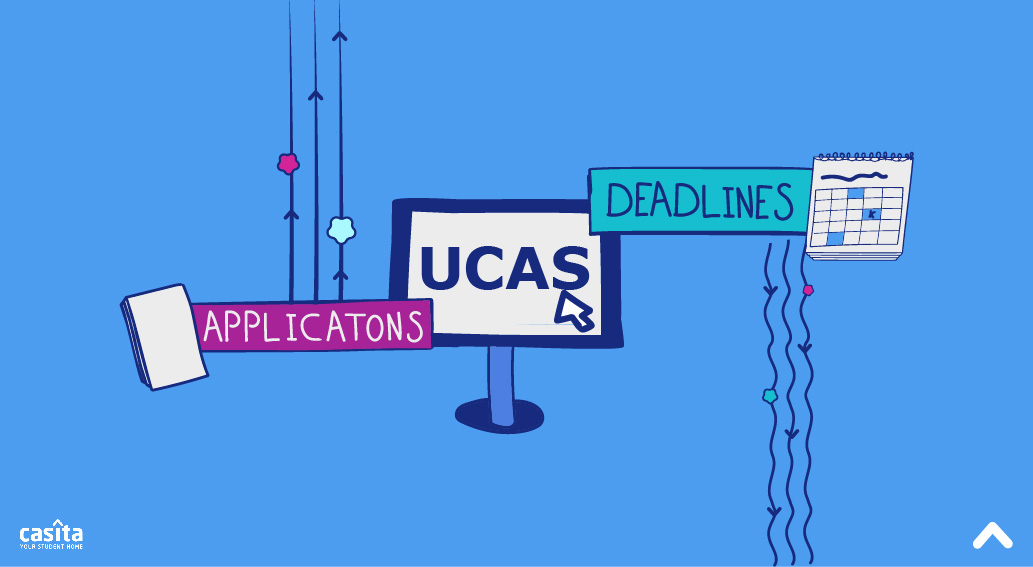A Guide to UCAS Deadlines and Application
Tips and Advice
University Life
6 mins read
Share

Updated at: 11 December, 2025
Published at: 13 January, 2020
By Allaa Ashraf
A Guide to UCAS Deadlines and Application
Tips and Advice
University Life
6 mins read

Updated at: 11 December, 2025
Published at: 13 January, 2020
By Allaa Ashraf
Share
If you are an international student pursuing a UK university offer, you surely know about UCAS and how critical it is when it comes to studying in the UK. It can be a bit stressful to go through a thoroughly calculated process, knowing that your whole future depends on it. But as stressful as it may be, it’s also so exciting and thrilling.
Applying to universities can be an exciting yet overwhelming process. To navigate this journey successfully, it's crucial to understand the UCAS (Universities and Colleges Admissions Service) deadlines and application procedures. This comprehensive guide will provide you with an in-depth understanding of the UCAS deadlines and application, in addition to essential tips to help you craft a strong and compelling application for your desired higher education institution.
What is UCAS?
UCAS (The Universities and Colleges Admissions Service) is a United Kingdom-based organisation that provides information, advice, and admissions services. You will come across UCAS when you try to apply to your university, as all full-time undergraduate course applications need to go through it. UCAS’s main role is to operate the application process for British universities, as well as send out offers to students.

UCAS Application Process
1. Registering with UCAS
Create an online UCAS account and provide personal details, educational background, and course choices.
2. Personal Statement
Craft a persuasive personal statement highlighting your academic achievements, extracurricular activities, work experience, and motivations for the chosen course.
3. Reference
Request a reference from a teacher or mentor who can provide an objective evaluation of your capabilities and potential.
4. Course Selection
Research universities and courses, considering entry requirements, module options, and university rankings, to make informed choices.
5. Application Fee
Pay the UCAS application fee, which is currently £22.50 for a single choice or £27 for multiple choices.

UCAS Deadlines and Application Dates (2023 Entry Application Deadlines)
For courses starting in 2023, your application should be submitted to UCAS by one of the following dates, depending on what courses you apply for. If you submit your completed application by the deadline, including all of your personal information and academic references, you are guaranteed that it will be considered.
Also, remember to check your school/college’s deadline if you are applying through it so you can get your application on time.
UCAS Deadlines
1. Main Deadline
The main UCAS offer deadline for most courses is typically in mid-January, the year prior to starting university. However, some courses, particularly medicine, dentistry, veterinary science, and Oxford or Cambridge applications, have earlier deadlines in October or November. Check the UCAS website for specific deadlines.
2. UCAS Extra
If you haven't received any offers or declined your existing offers, UCAS Extra allows you to apply for additional courses between late February and early July.
3. Clearing
If you didn't meet the conditions of your offers, didn't receive any offers, or applied after the main deadline, clearing provides an opportunity to find alternative courses with available spaces from July to September.

Updated Deadlines for the 2023 Entry
25 January 2023 at 18:00 (UK time): for certain courses, including dance, drama, and musical theatre courses. If you miss the January deadline, check the UCAS application deadline.
23 February 2023: UCAS Extra begins.
18 May: for applications submitted on or before January 25, university decisions are usually received by this date.
8 June 2023: reply to offers by this date if you receive all decisions by 18 May.
30 June 2023: applications received after this date are routed to Clearing, but those received before are routed to universities.
4 July 2023: application deadline for UCAS Extra.
5 July 2023: UCAS Clearing opens with vacancies beginning to be published.
12 July 2023: university decisions due for applications submitted by June 30th.
17 July 2023: you need to reply to offers by this date, if you received all decisions by 12 July.
21 September 2023: Last date for applications for 2023 entry.
17 October 2023: the deadline for adding clearing choices.
Missed Your Deadline?
Many courses still accept applications after the main application deadline. We advise you to check with the universities first to see if there are any openings, especially for courses with a deadline of October 15. This is because it's uncommon for them to accept late applications because their programmes are so competitive. Find out when you need to reply and about the different replies to UCAS undergraduate offers you can make.

How to Apply to UK Universities Using UCAS?
One of the most exciting experiences you may have is gathering the necessary information and paperwork for the UCAS application. Still, it is a lengthy process. Although there is much to do before you can submit your application online, you are not required to finish it all at once.
First, filter the courses available on UCAS’s platform and compare them. Then, you must check the university's entry requirements and ensure you are ready and fit all criteria. Finally, you have to complete the application online before the university admission deadline. Don’t worry, though, we can get you through every step via our How to Apply to a UK University as an International Student blog.
What Happens Next?
Waiting for decisions on your application can be agonising. You need to be patient, though, as each university and college makes its decisions at different times, which means you might hear back before your friends do, or vice versa. However, there are deadlines by which they will need to have decided. If the university you’ve applied to does not make a decision by the appropriate deadline, that choice will be automatically marked unsuccessful.
UCAS Offers
Conditional Offers
A conditional offer means that there are some conditions you have to meet to get your place confirmed. For most people, this means waiting for results day in the summer to see if their exam results meet the conditions. The conditions could be grades, scores, subjects, or additional documents, so the university can finalise your application. They reassess your application and the extra documents so that you can get your place.
Unconditional Offers
This means you've already met the entry requirements, so congratulations! The place is yours if you want it! But first, check the offer to see if there's anything else you need to do. You might need to get a DBS or PVG check, provide proof of your results, or submit other financial/medical documents. Contact your university or college if you have any questions or if a further requirement is unclear to you. By accepting an unconditional offer, you’re committed to attending that college or university and proceeding with the payment and visa application, if required.
If the offers you’ve received are not among the ones you’d like to go for, you can decline them and apply using Extra or Clearing.
Also, if you have been made an unconditional offer and are taking exams, your exam results won't affect your acceptance.

UCAS Extra and Clearing
UCAS Extra
Extra allows you to get another shot at getting a university offer. It usually starts in February and lasts until July. It is the official process for applicants who used all five choices but have not received any university offers or for those who have decided to decline their offers. Applicants can keep applying for one course at a time until they receive an offer they're happy with. UCAS Extra is your second chance to gain a place at a university or college.
UCAS Clearing
Most universities will still have available places on their courses after the exam results are published. The UCAS Clearing process helps applicants find and apply for those places at universities across the UK, which helps universities fill up any vacant spots on their courses.
If an applicant doesn't get the grades they need for the university course they wish to apply to, clearing gives them a chance to be on another course. This could be at the same university or a different one. Students can also apply for a university place directly through Clearing, even if they have not already made an application this year.

Tips for a Successful UCAS Application
1. Research and Preparation
Begin early by researching universities, courses, and entry requirements to choose the best options for your academic goals.
2. Personal Statement
Dedicate ample time to draft and refine your personal statement, showcasing your passion, relevant experiences, and suitability for the chosen course.
3. Reference
Communicate with your reference provider, sharing your aspirations and achievements, to help them write a strong and personalised reference.
4. Organisation
Keep track of deadlines, requirements, and necessary documents using a checklist or spreadsheet to ensure you submit everything on time.
5. Proofreading
Review your application thoroughly, checking for any grammatical errors or typos that might detract from your credibility.
6. Seek Guidance
Consult teachers, mentors, and university guidance counsellors for advice and feedback on your application.
Applying to universities through UCAS is an important step in your higher education journey. By understanding the UCAS deadlines and application process and implementing effective strategies, you can present a compelling application that shows your application, strengths, passion, and suitability for your desired course.
Remember to plan ahead, conduct thorough research, and seek guidance when needed. Good luck with your UCAS application, and may your academic aspirations take flight!
Tips and Advice
University Life
By Allaa Ashraf
Share
Tips and Advice
University Life
Updated at:
Published at:
By Allaa Ashraf
Share

